|
Tartan Day 2004
(Click the links below to
listen to our tribute)
Once again it is my
great pleasure to welcome you to the Scots Independent's website
'The Flag in the Wind' tribute to Tartan Day. Whether you are
enjoying Tartan Day in America, Canada and now in Scotland's
long-time ally in the Auld Alliance France or home here in Scotland,
we howp at ye hae a braw day.
Last year the shadow
of the Iraq War hung over Tartan Day and the fall out from the war
and the threat of International Terrorism continues to cast a long
shadow as recent events in Spain prove. But celebrating Tartan Day
is a celebration of Freedom and Democracy, the very opposite of the
terrorist aim.
Tartan Day in
America, Canada and France marks the day on which the Scottish
nobility appended their seals to the letter to Pope John XXII
asserting Scottish Freedom on 6 April 1320. The famous Declaration
of Arbroath has rung down the centuries reminding us of the eternal
value of Freedom. The Scottish poet John Barbour, Archdeacon of
Aberdeen, summed up the desire for Freedom in his 14th century
masterpice 'The Brus' -
A Fredome is ane nobil thing!
Fredome makis man to have liking,
Fredome all solace to man givis:
He lives at ease that frely livis!
A nobil hart may have nane ease,
Na ellis nocht that may him please,
Gif Fredome failye; for fre liking
Is yarnit owre all other thing.
- these words lie at
the very heart of Tartan Day.
Our skeilie webmaster
Alastair McIntyre of Electric Scotland has spent the last few months
in the USA and Canada and has kindly agreed to contribute some
thoughts on the Scottish influence on both countries to the 2004
Tartan Day Tribute.
Scottish
Influence in America and Canada
by Alastair McIntyre of Electric Scotland
If you should look at the various
declarations you'll see that both the USA and Canada are celebrating
Tartan Day to honour the contributions of emigrant Scots to their
countries, states and provinces.
What does that means exactly? Well it's really just that. Hundreds of
thousands of Scots emigrated to these countries from Scotland, either
due to Highland Clearances or simply that they sought a better life
elsewhere. These Scots made a huge contribution to their new countries
and this is a way of celebrating this and recognising their
contribution as well as touching base with Scottish roots.
Tartans and Pipes are still a powerful symbol of Scotland and you just
need to go to any of the hundreds of Highland Games held each year in
both the USA and Canada to see how popular these events are. You'll
see more Scottish flags flying, kilts worn, pipes playing at any one
event than you'll see in the whole of Scotland.
There is a real sense of pride in being of Scots descent and this goes
all over both countries. I've just spent 2 months in Kentucky where
there are huge amounts of descendants of the Scots and Scots-Irish.
You can sense the pride when they tell you they are a descendant and
even in the poorest places they aspire to get a kilt and learn to play
the bagpipes.
-
A quote from American
President Woodrow Wilson, "Every line of strength in American
history is a line colored with Scottish blood."
-
More than 100
governors of pre- and post- Revolutionary America were of Scottish
birth or descent.

And here is a picture of myself and Deb at
the St. Andrews Day Dinner in Ashland, Kentucky

Homer Meadows, Colin Grant-Adams and Jim
Stapleton Honors on the Haggis

Martin Smith Piping in the Haggis
I had a truly great time at this event and
each month the local Scottish historical society meets to share
information and trade stories.
Down in Southern
Georgia you'll find the Odom Genealogical Library where some 135
Scottish Clan Societies in the USA hold their archives. Each year they
hold their "Scottish Weekend" where clans come to update and check on
their archives and you'll even find representation from the Society of
Antiquarians in Scotland. The library produces the Family Tree
newspaper through the good offices of their editor, Beth Gay, another
Scots descendant. The paper reaches some 500,000 people of Scots
descent throughout North America.
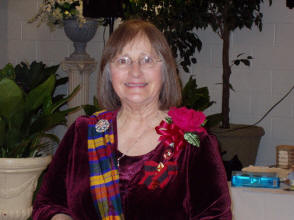
Excellent shot of Beth Gay the editor of the Family
Tree Newspaper
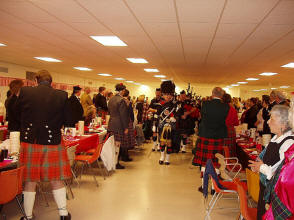

Lots of kilts on show
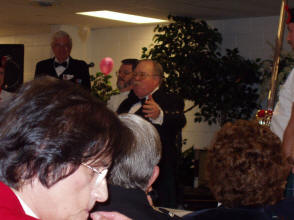
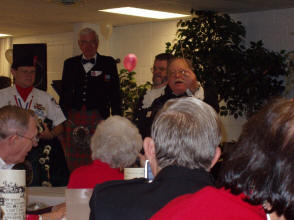
And the murdering of the haggis was a great entertainment :-)
"The Reverend Malcolm MacDonald, a native of
Whitton, Quebec, a descendant of the early Scots settlers and of the
first church established in the area, says:
"‘The Book of Books was the library they opened, and the Church of
Jesus Christ was the first institution they established and that in
their homes, and the Gospel of Christ was the philosophy they
espoused.’ "
"The most casual observer and historian must admit that these early
settlers played a leading part in setting the course in which the
Nation travels today.
"I am indeed grateful that we are privileged to stand in the stream
of a noble, spiritual, national and cultural tradition, which has
flourished in Scotland for centuries, and for some 150 years
established firmly on this North American Continent, in both Canada
and the United States.
I next went to Prince Edward Island where they tell
me over 60% of the population have some Scots blood in them and even
the official government cencus says that 38% of them are of Scots
descent. The sense of history on the island is everywhere.
From the book "Past and Present of Prince Edward Island" by MacKinnon
I found this paragraph...
This year 1803 is a notable one in the history of Prince Edward
island, for that was the year when the "Polly," the ship so famed in
this province, cast anchor in these waters, having brought a large
number of passengers from Scotland, to settle on Lord Selkirk's
estate. About this time he brought in all some eight hundred people to
Prince Edward Island. They were of the finest class of emigrants that
ever left the shores of Great Britain. They settled in what is known
by the general name of The Belfast District. The descendants still
occupy the land and homes which their forefathers occupied and made.
They were an enterprising and energetic people, and transmitted their
vigorous dispositions to their children and their children's children.
Descendants of the "Polly's" passengers have been distinguished in
almost every walk of life. They are to be found in every part of
Canada and the United States upholding the good name they inherited,
and making their island home known and respected where ever they may
be. They have produced many men who have distinguished themselves in
every profession, trade and walk of life. In the days when Prince
Edward Island boasted of her fleet of sailing ships, the men of Point
Prom and the other sections peopled by the descendants of these
immigrants, were found commanding ships in every sea. There was
scarcely a house that had not sent out one or more master mariners,
and they were of the best. Lord Selkirk did well for this island when
he brought these immigrants to her shores.


Here is where the Selkirk Settlers came ashore and there is a small
park and graveyard there which honours those settlers.



And the now famous College of Piping in Summerside on PEI
I am now in Kimberley, British Columbia and even
here you can find folk of Scots descent proud to say they have
Scottish blood in them. In today's climate you can find Ann Miller
(Stewart) from Rothsay selling log cabins. You can find Paul building
an Internet cafe whose parents are both Scottish. You can even find a
local building entrepreneur who's pround to say his great grandfather
was from Scotland and married a girl from the Ukraine. Even Randall
Walford, the local lawyer, is proud to say his mother is from
Scotland.


Now in BC and amongst the lovely scenary you find more Scots


Ann Miller from Rothsy and Billy Robb from Glasgow


Paul building his Internet cafe and note his Scotland jacket! And
Monty who's great grandfather was a Scot.
To round it off I am staying with a Scots
emigrant from Scotland, Billy Robb, know locally as "Oor Wullie" who
has an internet business, familycrests.ca, and proud as anything to be
from Glasgow. He does say that when he attends Highland Games he gets
a wee bit emotional when the massed pipe bands play at the end of the
games.
I hope that somehow the local Scots at home can find a way to touch
base with these Scots descendants all over the USA and Canada and not
just in showcase events in New York or Washington. How for example
should we touch base with the 100,000+ who turned out for the
Springtime
Tallahassee Parade was Saturday 3rd of April in Florida. You'll note
from the pictures that they are promoting their
Highland Games and
Celtic Festival on 30 October 2004 and that the Talahassee St Andrews Society
is parading. Note the number of Kilts and Pipers and Flags!






I for one have always felt that the Scottish
Executive and Scotland in general lack real vision when it comes to
communication with the estimated 50 million people of Scots descent
all over the world. For example just look at the number of people
there are of Scots descent in the cities of Canada...
Canadians of Scottish Descent by
City - 2001 Census of Canada
| City (Metro Area) |
Total City Pop. |
Scottish Origin |
% of City Pop. |
|
Toronto,
Ontario |
4,647,960 |
517,115 |
11% |
|
Montreal,
Quebec |
3,380,645 |
94,705 |
3% |
|
Vancouver,
British Columbia |
1,967,480 |
311,940 |
16% |
|
Calgary,
Alberta |
943,310 |
189,055 |
20% |
|
Edmonton,
Alberta |
927,020 |
164,665 |
18% |
|
Ottawa,
Ontario |
795,255 |
142,390 |
18% |
|
Quebec City,
Quebec |
673,105 |
9,335 |
.01% |
|
Winnipeg,
Manitoba |
661,730 |
117,920 |
18% |
|
Hamilton,
Ontario |
655,060 |
125,490 |
19% |
|
Halifax,
Nova Scotia |
355,940 |
96,305 |
27% |
|
Victoria,
British Columbia |
306,970 |
79,275 |
26% |
|
Saskatoon,
Saskatchewan |
222,635 |
42,735 |
19% |
|
Regina,
Saskatchewan |
190,015 |
37,275 |
20% |
|
St. John’s,
Newfoundland |
171,105 |
13,520 |
8% |
|
Saint John,
New Brunswick |
121,340 |
29,610 |
24% |
|
Charlottetown, PEI |
57,295 |
24,090 |
42% |
| |
|
1,995,425 |
|
Note 1: The
foregoing figures represent the Metropolitan Area population of
Canadian cities as listed in the 2001 Census for Canada. Prepared by
W. Neil Fraser, Chairman, Clan Fraser Society of Canada
Now that's almost 2 million
people and even then we know that there are even more than are
officially reported as in PEI three local historians are positive that
over 60% of the island has Scots blood in them even though the census
says just 38% are of Scots descent.
One could write volumes about the Scots who made it over to these
shores but suffice it to say that the Scots are alive and well and
living in the USA and Canada.
If you would like to read about just some of the contributions made by
these Scots you might like to read...
"The Scot in North British America"
http://www.electricscotland.com/history/canada/scot/index.htm
"Scots around the World"
http://www.electricscotland.com/history/world/links.htm
And to learn something of the process of settlement you might like to
read a section from "The Founding of Cavendish" at
http://www.electricscotland.com/history/articles/cavendish.htm
Celebrating the Pipes
(by Gordon Duncan)
Be Waukrife, Scotland!
by W D Cocker
Read by Marilyn Wright
Click
here to listen to this in RealAudio
This poem appeared in the March 1931
issue of the Scots Independent. W D Cocker was born in Glasgow and
worked there as a jounalist on the Daily Record, but his poems
mostly evoke the Stirlingshire farms of his mother's family.
Wae's me ! auld Scotland's in a dwam ;
The Lion Rampant's lost his smeddum,
An' coories like a frichtit lamb,
Puir dwaibly cratur, wha would dread 'm ?
Be waukrife, Scotland ! Up an' roar,
An' get ye into fechtin' fettle ;
Dinna be blate, in days o' yore
Ye were na feart to show your mettle.
Ower lang ye've tholed the Saxon rule,
A "Union" that but meant suppression,
Ye've learned, in bitter days o' dool,
What England gets by that concession.
They've ryped your pooch, an' taxed ye sair,
They've taen the last bite frae your mooth ;
They've strippit puir auld
Scotland bare,
An' spent the siller in the sooth.
Wi' alien croods your toons are thrang,
Your industries hae dwined awa',
Your sons ayont the seas maun gang,
Or thowless-like the "dole" maun draw.
An' what's cam' ower the glens an' hills,
Whaur bonnie crofts the e'e did cheer ?
To mak' a sport for feckless fules
They've laid bare for droves o' deer.
Gude kens, we wish the Empire weel,
We'll no' ding doon the Constitution,
Gin we're respeckit - wha the deil
Thinks Scotland's sons want Revolution ?
But yet oor ain affairs we'll redd,
An' guide oorsels. Then dinna swither,
By Wallace an' the bluid he shed,
For Scotland's richts, let's staun thegither !
Tartan Day and
the Declaration of Arbroath
by Peter
Wright, Chairman of the Scots Independent Newspaper
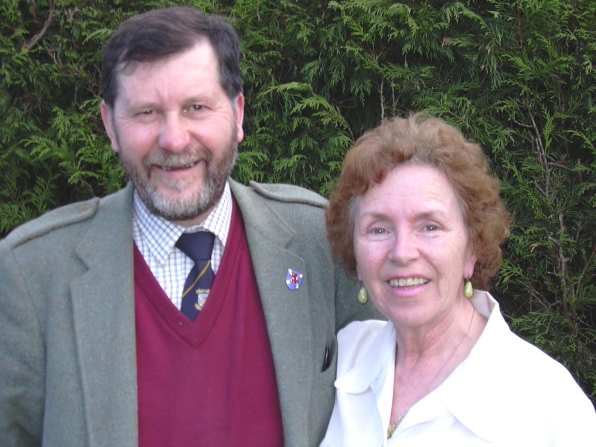
Peter and Marilyn Wright
Tartan Day
celebrations in America and Canada have been centred round one of
the most important dates in Scottish history - 6 April 1320 - the
date when the Scottish nobles appended their seals to the letter to
Pope John XXII, on behalf of the Community of the Realm, asserting
Scottish Independence at Arbroath Abbey.This year will also see
Tartan Day celebrations in Scotland's long-time ally France and
perhaps most appropriately the Burgh of Arbroath itself. Arbroath
plans a week of celebration from 3-10 April 2004.
The Declaration of
Arbroath, is a document of historic importance not only to Scots but
to the world. It marked the emergence of Scotland as the first
Nation State in Europe in the modern sense and the seeds of
democracy by declaring that a ruler could be removed if he failed
the people.The Arbroath Letter was to inspire another historic
document - The American Declaration of Independence
In the splendid
Saltire Society reprint 'A Scottish Postbag - Eight centuries of
Scottish letters' (2003) the joint editors, Paul H. Scott and the
late George Bruce, wrote of The Declaration of Arbroath :

'The document known
as the Declaration of Arbroath, the most important and best known in
Scottish history, was a letter, if of a specialised kind. It was a
diplomatic communication from the barons and 'whole community of the
realm' of Scotland to Pope John XXII, remarkable for both its
eloquence and persuasiveness and for the boldness and originality of
its ideas. Long before such conceptions were found elsewhere in
Europe, it spoke for the whole community and asserted the ideas that
the independence of the nation was worth defending for its own sake
and that rulers exist to serve the community and not the reverse.'
The crux of the
Declaration lies in the following words -
'But from these
countless evils we have been set free, by the help of Him Who though
He afflicts yet heals and restores, by our most tireless Prince,
King and Lord, the Lord Robert. He, that his people and his heritage
might be delivered out of the hands of our enemies, met toil and
fatigue, hunger and peril, like another Maccabaeus or Joshua and
bore them cheerfully. Him, too, divine providence, his right of
succssion according to our laws and customs which we shall maintain
to the death, and the due consent and assent of us all have made him
our Prince and King. To him, as to the man by whom salvation has
been wrought unto our people, we are bound both by law and by his
merits that our freedom may be still maintained, and by him, come
what may, we mean to stand.
Yet if he should give
up what he has begun, and agree to make us or our kingdom subject to
the King of England or the English, we should exert ourselves at
once to drive him out as our enemy and a subverter of his own rights
and ours, and make some other man who was well able to defend us our
King; for, as long as but a hundred of us remain alive, never will
we on any conditions be brought under English rule. It is in truth
not for glory, nor riches nor honours that we are fighting, but for
freedom - for that alone, which no honest man gives up but with life
itself.' ( Part of a translation by Sir James Fergusson from the
Latin original.)
These words have rung
down the centuries. In any other country in the world, a document
such as The Declaration of Arbroath would be marked by a National
Public Holiday, but not in a Scotland, still tied to rule from
outwith her own borders. Hopefully the celebration of the date in
other countries will help convince Scots that Scottish Freedom
should be regained and the words of 1320 honoured.
In
Thirteen-Twenty Scotland said,
Should England dare our soil to tread,
The blood will flow in rivers red,
Before capitulation.
No more will Scotland bow the knee,
To foreign prince who e're he be,
For come what may we'll aye be free,
From English domination.
Here's to the
men who took the oath,
The Declaration of Arbroath,
Freedom and right, our cause is both,
To save us from damnation.
Out with traitor, out with foe,
Give the Saxon blow for blow,
And freedom's brightest star shall glow,
Above the Scottish nation.
Its not for
honour that we sigh,
Nor glory makes us long to die.
But liberty is Scotland's cry,
No English subjugation.
Our fathers didn't die in vain,
For while a hundred men remain,
No English king shall o'er us reign,
Stand up for Scotland's nation.
Too long
we've played the tartan fool,
Too long we've bowed to English rule,
Too long we've cringed before John Bull,
Afraid of confrontation.
So heed the words from Bruce's pen,
Scotland must be free again,
Stand up a hundred Scottish men,
Who'll honour the Declaration.
Allons,
enfants de la Patrie,
Le jour de
gloire est arrivé;
Contre
nous, de la tyrannie
L'étendard
sanglant est levé,
L'étendard
sanglant est levé.
Entendez-vous
dans nos campagnes
Mugir ces
féroces soldats?
Ils
viennent jusque dans nos bras
Egorger
nos fils, nos compagnes.
Aux armes, Citoyens!
Formez vos bataillons!
Marchons!
Marchons!
Qu'un sang impur abreuve nos sillons.
Nous
entrerons dans la Carrière
Quand nos
aînés n'y seront plus;
Nous y
trouverons leurs poussières,
Et la
trace de leurs vertus.
Et la
trace de leurs vertus.
Bien
moins jaloux de leur survivre,
Que de
partager leurs cercueils;
Nous
aurons le sublime orgueil,
De les
venger ou de les suivre.
Aux
armes, Citoyens!
Formez vos bataillons!
Marchons!
Marchons!
Qu'un sang impur abreuve nos sillons.
Amour
sacré de la Patrie
Conduis,
soutiens nos bras vengeurs
Liberté,
Liberté chérie,
Combats
avec tes défenseurs;
Combats
avec tes défenseurs;
Sous nos
drapeaux, que la Victoire
Accours à
tes mâles accents,
Que nos
ennemis expirants
Voient ton
triomphe et notre gloire.
Aux armes, Citoyens!
Formez vos bataillons!
Marchons!
Marchons!
Qu'un sang impur abreuve nos sillons.
Footnote - This marching song of the French
Army of the Revolution became the National Anthem of France. We print it
to celebrate both the French National Day, Bastille Day on 14th July,
and to commemorate the Auld Alliance between Scotland and France.
Footnote - I write the text of the 3rd part
of this hymn that is officially always in use to day. There were 4 or 5
other parts written by Rouget de Lisle at the origin, but after the
Révolution, they have been forbidden. The 3 parts I wrote here, are
always officially the French national anthem. Sincerely yours,
Jacques-Yves Hespel-Van de Walle.
Speech
delivered by General de Gaulle at Edinburgh, 23rd June 1942
I do
not think that a Frenchman could have come
to Scotland at any time without being sensible of a special emotion.
Scarcely can he set foot in this ancient and glorious land before he
finds countless natural affinities between your country and ours dating
from the very earliest times. In the same moment, awareness of the
thousand links, still living and cherished, of the Franco-Scottish
Alliance, the oldest alliance in the world, leaps to his mind.
When I say "Franco-Scottish
Alliance," I am thinking, firstly, of course, of that close political
and military entente which, in the Middle Ages, was established
between our ancient monarchy and yours.
I am thinking of the Scottish
blood which flowed in the veins of our kings and of the French blood
which flowed in the veins of your kings, of glory shared on past
battlefields, from the siege of Orleans, raised by Joan of Arc, to
Valmy, where Goethe recognised that a new age was dawning for the world.
In every combat where for five
centuries the destiny of France was at stake, there were always men of
Scotland to fight side by side with men of France, and what Frenchmen
feel is that no people has ever been more generous than yours with its
friendship.
Yet in our old alliance there was
more than a common policy, more than marriages and fighting deeds. There
were not only the Stuarts, the Queens of France and Scotland, Kennedy,
Berwick, Macdonald, and the glorious Garde écossaise. There were
also a thousand ties of spirit and soul. How could we forget the mutual
inspiration of French and Scottish poets, or the influence of men like
Locke and Hume on our philosophy? How could we fail to recognise what is
common to the Presbyterian Church of Scotland and the doctrines of
Calvin? How could we hide the influence which the great Walter Scott has
exercised over the receptive mind of French youth? How could we ignore
all the exchanges of ideas, feelings, customs, and even words so
frequent between two peoples joined by a natural friendship, a
friendship of which a visit to Edinburgh affords such ample proof?
This friendship and understanding
which Frenchmen have found in Scotland throughout history are to-day
more precious than ever. Undoubtedly, they are mingled at the present
time with the joint aims, efforts, and ideals which go to make up the
alliance between France and Great Britain. But I think I can say,
without giving cause for offence, that although mingled, they are not
lost in the mingling, and they retain their special character, just as
in a bouquet a single flower still keeps its own perfume and colour.
That the soil of France enfolds
lovingly the thousands and thousands of Scots whose blood was shed with
that of our own soldiers during the last war, I can affirm. The monument
to their memory on the hill of Buzancy has, I know, never been more
frequently bedecked with flowers than since the new invasion. If the
roses of France are bloodstained to-day, they still cluster round the
thistle of Scotland. For my part, I can say that the comradeship of
arms, sealed on the battlefield of Abbeville in May-June, 1940, between
the French armoured division which I had the honour to command and the
gallant 51st Scottish Division under General Fortune, played its part in
the decision which I made to continue the fight at the side of the
Allies to the end, come what may.
We live at a time when every
friendship counts, especially those which have lasted longest. That
which you extend to us in the difficult task my comrades and I have
undertaken affords comforting proof that, like your forefathers, you
know where the real France stands and you have kept your faith in her
future. We, like our forefathers, will know how to repay.
And that is why, in thanking you
for the truly touching reception which you have given me here, I close
by quoting the old motto of the Compagnie
écossaise:
Omni modo fidelis.

Statue of Robert the Bruce at Bannockburn "Scots Wha Hae"
By Robert Burns
Sung by Gaberlunzie Scots, wha hae wi' Wallace bled
Scots, wham Bruce has aften led
Welcome to your gory bed
Or to victory!
Now's the day an' now's the hour
See the front of battle lour
See approach proud Edward's pow'r
Chains and slavery!
Wha would be a traitor knave?
Wha would fill a coward's grave?
Wha sae base as be a slave?
Let him turn and flee!
Wha for Scotland's king an' law
Freedom's sword would strongly draw
Freeman stand and freeman fa'
Let him on wi' me!
By oppression's woes and pains
By your sons in servile chains
We will drain our dearest veins
But they shall be free.
Lay the proud userpers low!
Tyrants fall in ev'ry foe
Liberty's in every blow
Let us do or dee!

Gordon has produced a CD
"Scotland, a wee country wi' a BIG impact on the World" which he's
kindly let us use for this Tartan Day celebration. It's 45 minutes
playing time.
Click here to listen to it (5.5Mb)
HAVE A BRAW
TARTAN DAY
If you'd like to monitor
Scotland's continued fight for Independence visit the
Flag in the Wind each Friday for up to date analysis
and comment.
Should you want to learn more about Scottish History
and Scots around the world then visit
ElectricScotland.com
We'd like to take this opportunity
to thank Greentrax and
Gordon Duncan for the pipe music and Gaberlunzie
and Gill Bowman for the songs.
|

